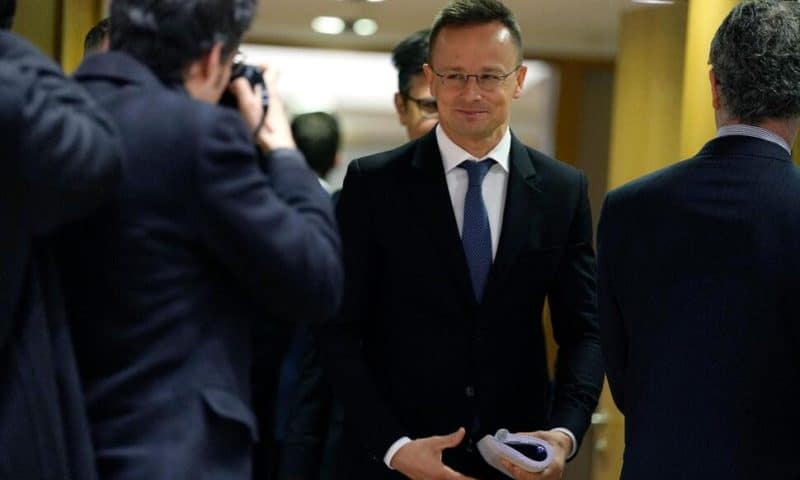Hungary’s foreign minister says his country won’t block a planned tranche of 500 million euros ($543 million) in European Union arms funding to Ukraine to use in the war with Russia
BUDAPEST, Hungary — Hungary’s foreign minister said Monday that while his government isn’t in favor of the European Union sending funding for weapons to Ukraine, it won’t block a planned tranche of 500 million euros ($543 million) in assistance to Kyiv to use in the war with Russia.
Speaking at a news briefing on the sidelines of a meeting of EU foreign ministers in Brussels, Peter Szijjarto dismissed as “lies” media reports that emerged last week that Hungary planned to veto the funds earmarked for Ukraine under the bloc’s European Peace Facility.
Hungary opposes the delivery of Western weapons to Ukraine — something Szijjarto said could “lead to the prolongation or potential escalation” of the war — but the government won’t veto the aid package, he said.
“We don’t consider weapons shipments, nor the hundreds of millions of euros Europe has spent to finance them, a good idea. But we won’t block the decision,” he said.
While Hungary’s government hasn’t blocked previous payouts under the facility, which has to date delivered 3.1 billion euros in arms funding to Ukraine, it did veto an 18-billion euro aid package in December, leaving the EU’s other 26 nations scrambling to keep the money supply going.
Budapest has also vocally opposed sanctions against Moscow, arguing they have done more damage to EU countries than to Russia, and has refused to provide Ukraine with weapons or allow their transfer across its border with Ukraine.
On Monday, Szijjarto warned that Hungary would oppose any future EU proposals to level sanctions on Russia’s nuclear power industry, arguing such a decision would adversely affect operations of Hungary’s only nuclear power plant, which is powered by Russian-produced nuclear fuel.
“We will never accept a single decision that would even slightly limit Hungarian-Russian nuclear cooperation,” he said. “It would put the security of our national energy supply at risk, and nobody should expect that from us.”
Szijjarto also called on Ukraine’s government to respect the rights of the Hungarian ethnic minority in the western Ukrainian region of Transcarpathia, where he said ethnic Hungarians had recently been victims of “concentrated attacks” by local authorities.
“We strongly protest against these measures and it must also be seen that each such measure makes it very difficult for us to make decisions in support of Ukraine in the future,” Szijjarto said.

